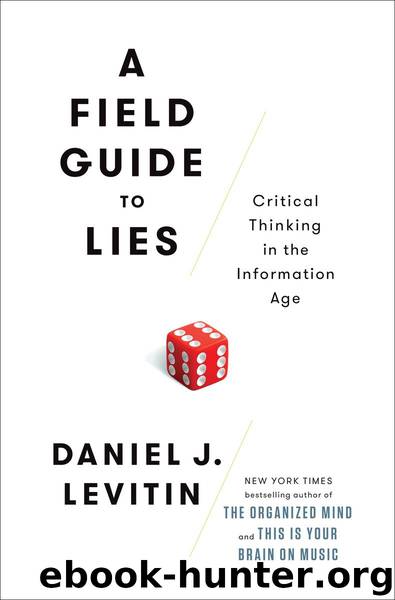A Field Guide to Lies by Daniel J. Levitin

Author:Daniel J. Levitin
Language: eng
Format: epub
Publisher: Penguin Publishing Group
Published: 2016-08-10T15:52:16+00:00
Cherry-picking
Our brains are built to make stories as they take in the vastness of the world with billions of events happening every second. There are apt to be some coincidences that don’t really mean anything. If a long-lost friend calls just as you’re thinking of her, that doesn’t mean either of you has psychic powers. If you win at roulette three times in a row, that doesn’t mean you’re on a streak and should bet your last dollar on the next spin. If your non-certified mechanic fixes your car this time, it doesn’t mean he’ll be able to do it next time—he may just have gotten lucky.
Say you have a pet hypothesis, for example, that too much Vitamin D causes malaise; you may well find evidence to support that view. But if you’re looking only for supporting evidence, you’re not doing proper research, because you’re ignoring the contradictory evidence—there might be a little of this or a lot, but you don’t know because you haven’t looked. Colloquially, scientists call this “cherry-picking” the data that suit your hypothesis. Proper research demands that you keep an open mind about any issue, and try to valiantly consider the evidence for and against, and then form an evidence-based (not a “gee, I wish this were so”–based) conclusion.
A companion to the cherry-picking bias is selective windowing. This occurs when the information you have access to is unrepresentative of the whole. If you’re looking at a city through the window of a train, you’re only seeing a part of that city, and not necessarily a representative part—you have visual access only to the part of the city with train tracks running through it, and whatever biases may attach to that. Trains make noise. Wealthier people usually occupy houses away from the noise, so the people who are left living near the tracks tend to have lower income. If all you know of a city is who lives near the tracks, you are not seeing the entire city.
This is of course related to the discussion in Part One about data gathering (how data are collected), and the importance of obtaining representative samples. We’re trying to understand the nature of the world—or at least a new city that the train’s passing through—and we want to consider alternative explanations for what we’re seeing or being told. A good alternative explanation with broad applicability is that you’re only seeing part of the whole picture, and the part you’re not seeing may be very different.
Maybe your sister is proudly displaying her five-year-old daughter’s painting. It may be magnificent! If you love the painting, frame it! But if you’re trying to figure out whether to invest in the child’s future as the world’s next great painter, you’ll want to ask some questions: Who cropped it? Who selected it? How big was the original? How many drawings did the little Picasso make before this one? What came before and what came after? Through selective windowing, you may be seeing part of a series
Download
This site does not store any files on its server. We only index and link to content provided by other sites. Please contact the content providers to delete copyright contents if any and email us, we'll remove relevant links or contents immediately.
| Biomathematics | Differential Equations |
| Game Theory | Graph Theory |
| Linear Programming | Probability & Statistics |
| Statistics | Stochastic Modeling |
| Vector Analysis |
Modelling of Convective Heat and Mass Transfer in Rotating Flows by Igor V. Shevchuk(6440)
Weapons of Math Destruction by Cathy O'Neil(6279)
Factfulness: Ten Reasons We're Wrong About the World – and Why Things Are Better Than You Think by Hans Rosling(4742)
A Mind For Numbers: How to Excel at Math and Science (Even If You Flunked Algebra) by Barbara Oakley(3306)
Descartes' Error by Antonio Damasio(3277)
Factfulness_Ten Reasons We're Wrong About the World_and Why Things Are Better Than You Think by Hans Rosling(3237)
TCP IP by Todd Lammle(3184)
Fooled by Randomness: The Hidden Role of Chance in Life and in the Markets by Nassim Nicholas Taleb(3123)
The Tyranny of Metrics by Jerry Z. Muller(3072)
Applied Predictive Modeling by Max Kuhn & Kjell Johnson(3070)
The Book of Numbers by Peter Bentley(2968)
The Great Unknown by Marcus du Sautoy(2694)
Once Upon an Algorithm by Martin Erwig(2649)
Easy Algebra Step-by-Step by Sandra Luna McCune(2635)
Lady Luck by Kristen Ashley(2579)
Police Exams Prep 2018-2019 by Kaplan Test Prep(2546)
Practical Guide To Principal Component Methods in R (Multivariate Analysis Book 2) by Alboukadel Kassambara(2543)
All Things Reconsidered by Bill Thompson III(2393)
Linear Time-Invariant Systems, Behaviors and Modules by Ulrich Oberst & Martin Scheicher & Ingrid Scheicher(2370)
